 Scripture is replete with references to what is known as counterfactuals of creaturely freedom. These are descriptions of what creatures would do given other circumstances. Paul asserts, for example that “None of the rulers of this age understood this; for if they had, they would not have crucified the Lord of Glory.” (1 Corinthians 2:8). If the rulers of this age possessed certain information, then they would not have crucified Jesus. God knows what these creatures would do given other particular circumstances. Similarly, when David was fleeing from Saul, he asked God two questions, first, “If I stay in this city, will Saul attack it?” and God answered, “Yes.” He pressed the further question, “If Saul attacks, will the people of the city turn me over?” and God answered, “Yes.” (1 Samuel 23:6-14). But neither of these events came to pass. This is therefore knowledge of what would happen in other circumstances. We regularly employ this sort of knowledge, as we assess things like, “If I pull out into traffic, I would get into an accident.” We know the truth-value in these counterfactuals. Since there is truth-value in them, it follows that God knows the truth-value.
Scripture is replete with references to what is known as counterfactuals of creaturely freedom. These are descriptions of what creatures would do given other circumstances. Paul asserts, for example that “None of the rulers of this age understood this; for if they had, they would not have crucified the Lord of Glory.” (1 Corinthians 2:8). If the rulers of this age possessed certain information, then they would not have crucified Jesus. God knows what these creatures would do given other particular circumstances. Similarly, when David was fleeing from Saul, he asked God two questions, first, “If I stay in this city, will Saul attack it?” and God answered, “Yes.” He pressed the further question, “If Saul attacks, will the people of the city turn me over?” and God answered, “Yes.” (1 Samuel 23:6-14). But neither of these events came to pass. This is therefore knowledge of what would happen in other circumstances. We regularly employ this sort of knowledge, as we assess things like, “If I pull out into traffic, I would get into an accident.” We know the truth-value in these counterfactuals. Since there is truth-value in them, it follows that God knows the truth-value.
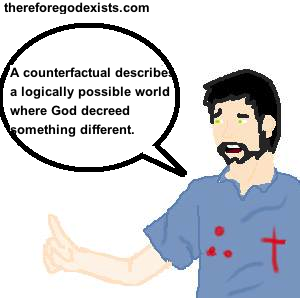 Determinists have often been keen to say that there are no true counterfactuals. There is no truth-value in such propositions, because they are not actual. But that seems like a stance that would be difficult to rationally maintain, for we can plainly see these counterfactuals in Scripture and we use them in our daily lives. Therefore, there are other determinists who argue that God does know the truth-value in counterfactuals. But, they suggest, these counterfactuals are grounded in God’s decree. He decreed every event and movement that will come to pass. He decreed all of the conditions of the universe. Therefore, he knows what would happen if one were to remove these conditions. But since his knowledge of counterfactuals is based on his decree of what will come to pass, he does not use this knowledge to arrange the world as Molinists claim. So is God’s knowledge of counterfactuals based on his decree?
Determinists have often been keen to say that there are no true counterfactuals. There is no truth-value in such propositions, because they are not actual. But that seems like a stance that would be difficult to rationally maintain, for we can plainly see these counterfactuals in Scripture and we use them in our daily lives. Therefore, there are other determinists who argue that God does know the truth-value in counterfactuals. But, they suggest, these counterfactuals are grounded in God’s decree. He decreed every event and movement that will come to pass. He decreed all of the conditions of the universe. Therefore, he knows what would happen if one were to remove these conditions. But since his knowledge of counterfactuals is based on his decree of what will come to pass, he does not use this knowledge to arrange the world as Molinists claim. So is God’s knowledge of counterfactuals based on his decree?
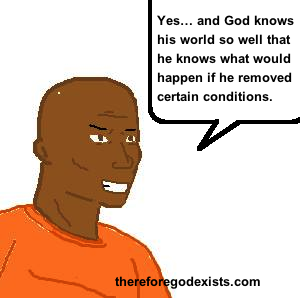 Counterfactuals describe a world where something different was decreed. Consider the counterfactual claim, “None of the rulers of this age understood this; for if they had, they would not have crucified the Lord of Glory.” If the rulers had known some fact, then they would have done something differently. Of course, this is not descriptive of the actual world. It is descriptive of some possible world. In some possible world, God decreed that the rulers of the age had some information and therefore did not crucify the Lord of Glory. God would have had to create a different world for this to occur. Since all of mans’ actions are rooted in God’s decree, this counterfactual describes a world wherein God decreed that the rulers did understand therefore did not crucify the Lord of Glory. It describes a different possible world.
Counterfactuals describe a world where something different was decreed. Consider the counterfactual claim, “None of the rulers of this age understood this; for if they had, they would not have crucified the Lord of Glory.” If the rulers had known some fact, then they would have done something differently. Of course, this is not descriptive of the actual world. It is descriptive of some possible world. In some possible world, God decreed that the rulers of the age had some information and therefore did not crucify the Lord of Glory. God would have had to create a different world for this to occur. Since all of mans’ actions are rooted in God’s decree, this counterfactual describes a world wherein God decreed that the rulers did understand therefore did not crucify the Lord of Glory. It describes a different possible world.
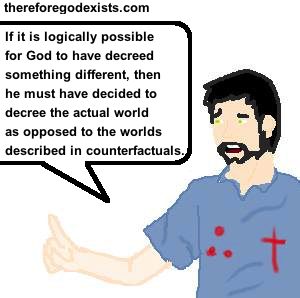 The question is, could God know that he had the option to create a different possible world based on his decree? Well, a counterfactual describes a world where God decreed something different to occur. This means that it is logically possible for God to have decreed something different. But if it is logically possible for him to have decreed something different, his knowledge of what he could decree is logically prior to the decree. For if he could decree something different to occur, it follows that his knowledge of these different events could not be based on his decree. Is God’s knowledge of counterfactuals based on his decree? On the contrary, his decree is contingent upon his knowledge of what would happen given different conditions. Accordingly, God’s knowledge of counterfactuals is not grounded in his decree.
The question is, could God know that he had the option to create a different possible world based on his decree? Well, a counterfactual describes a world where God decreed something different to occur. This means that it is logically possible for God to have decreed something different. But if it is logically possible for him to have decreed something different, his knowledge of what he could decree is logically prior to the decree. For if he could decree something different to occur, it follows that his knowledge of these different events could not be based on his decree. Is God’s knowledge of counterfactuals based on his decree? On the contrary, his decree is contingent upon his knowledge of what would happen given different conditions. Accordingly, God’s knowledge of counterfactuals is not grounded in his decree.
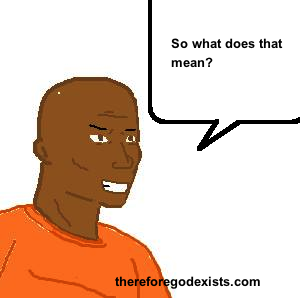 God’s natural knowledge can account for counterfactuals. If God knows that he is capable of bringing forth a creature with libertarian freedom, it follows that he knows how that creature would respond to certain circumstances that he puts this creature in. He knows how this creature would relate to others and what sort of person this creature would be if he were put in Nazi Germany or if he were put in ancient Greece. Both of these settings would nurture free creatures in different ways. God knows [1] he is capable of creating a free creature and [2] how this free creature would react if he were put in different circumstances. Is God’s knowledge of counterfactuals based on the decree? No, for if it is even possible to create a free creature, then God knows how this free creature would react given different circumstances. This can be attributed to God’s self-understanding.
God’s natural knowledge can account for counterfactuals. If God knows that he is capable of bringing forth a creature with libertarian freedom, it follows that he knows how that creature would respond to certain circumstances that he puts this creature in. He knows how this creature would relate to others and what sort of person this creature would be if he were put in Nazi Germany or if he were put in ancient Greece. Both of these settings would nurture free creatures in different ways. God knows [1] he is capable of creating a free creature and [2] how this free creature would react if he were put in different circumstances. Is God’s knowledge of counterfactuals based on the decree? No, for if it is even possible to create a free creature, then God knows how this free creature would react given different circumstances. This can be attributed to God’s self-understanding.
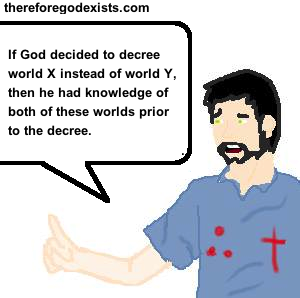 The determinist might be inclined to say that it is logically impossible for God to create a free creature. It would be something like creating a square circle, or a rock too heavy for himself to lift. It would compromise his sovereignty. However, by introducing Molinist thought to this paradigm, the tension between sovereignty and freedom seems to be distilled. The Molinist asserts that God is sovereign over the free choices of men. He puts men in certain situations knowing that they would freely choose to bring about his will. This would retain the highest conceivable view of sovereignty while establishing the freedom of man.
The determinist might be inclined to say that it is logically impossible for God to create a free creature. It would be something like creating a square circle, or a rock too heavy for himself to lift. It would compromise his sovereignty. However, by introducing Molinist thought to this paradigm, the tension between sovereignty and freedom seems to be distilled. The Molinist asserts that God is sovereign over the free choices of men. He puts men in certain situations knowing that they would freely choose to bring about his will. This would retain the highest conceivable view of sovereignty while establishing the freedom of man.
In my debate with TurretinFan and Josh Sommer, TurretinFan suggested that this is not a high enough view of sovereignty. For God needs to be sovereign not only over what we do, but also what we would do in any possible circumstance. But this seems to misunderstand the Molinist assertion. The Molinist is saying that God is sovereign in the actual world. In the actual world, God is sovereign over our free choices. It seems strange to say that God must be sovereign over choices that were never made. But even if I were to grant that, the Molinist would still say that in every possible world, God is putting people in situations and is still sovereign over their choices. If he actualized their choices in the real world, he would be sovereign over them then as well. Thus in every possible world, God is sovereign over the free choices of men.
So I do not think there is any incompatibility between sovereignty and freedom of the will. Therefore there is no reason to think that it is logically impossible for God to bring forth a free creature. Since it is logically possible for God to bring forth a free creature, he therefore knows and understands how this free creature would react given any possible circumstance. Is God’s knowledge of counterfactuals based on his decree? Well that makes the unjustified assumption that freedom of the will is logically impossible.
Did God decree the truth-value in propositions that describe totally fictional and bizarre events? God knows the truth-value in the propositions concerning what would happen given other circumstances. Consider the proposition, “If an alien-human hybrid were the ruler of a nation in an alternate universe, the citizens would be suspicious of him.” For they might be afraid that he was infiltrating the earth to convoke the wrath of his alien overlords. The truth-value of this proposition will depend on the history of the people and their relationship with the aliens. But consider the law of the excluded conditional middle. We could make the proposition, “If an alien-human hybrid were the ruler of a nation in an alternate universe, the citizens either would or would not be suspicious of him.” Are we to say that God does not know the truth-value of that proposition? I know the truth-value. It is obviously true because the nature of the claim leaves no other options. From the law of conditional excluded middle, it follows that God must have knowledge of what would happen given other circumstances.
The determinist will be reduced to saying that God has decreed that such a proposition would be true. He has decreed any number of bizarre propositions to be true. He has decreed that if Bobby Brady were to go to Narnia, then certain events would transpire. He has decreed what would happen if Spock went to the island portrayed on Lost. God has decreed that if you go to Narnia, you either would or would not preach the gospel to a Talking Dog. Since the law of the excluded conditional middle assures us that this proposition has truth value, it follows that God must have decreed it to be so. The question is, do you really think that God has decreed such things?
Is God’s knowledge of counterfactuals grounded in his decree? These three arguments render it implausible that this is the case. For a counterfactual describes a world in which God decreed that something different would happen. Since God could have decreed them, then he must have decided to decree the actual world rather than the other possible worlds that are found in the various counterfactuals. Thus his knowledge of counterfactuals cannot be grounded in the decree. Second, God’s knowledge of his ability to create a free creature moves his knowledge of counterfactuals into his self-understanding. Third, for us to say that God’s knowledge of counterfactuals is grounded in the decree reduces us to the monstrosity of God decreeing facts about civilizations concerning alien-human hybrids, Narnia, et cetera.
*Addendum: The author of this post has moved away from Molinism. This article should be used for research purposes only.
If you would like to get in on the discussion about this, join my Theology Discussion Group!